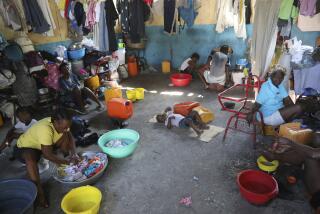1 Million May Starve in Embattled Horn of Africa
- Share via
WASHINGTON — As many as 1 million people will starve in the coming months in the African nations of Ethiopia, Somalia and Sudan despite the efforts of relief agencies, a panel of hunger experts said Monday.
Another 21 million people in the three countries are “at risk” of starvation and could perish if food aid is not increased and means found to deliver it to those in need.
The estimates, admittedly rough, were made by experts from Bread for the World, the church-based grassroots anti-hunger group, and the U.S. Committee for Refugees and were based on recent visits to the area and U.N. reports on the amount of food aid getting into the drought- and civil war-stricken areas.
“According to the United Nations, only half of the 1.25 million metric tons of food needed in Ethiopia has been pledged, with only a fraction of that amount delivered,” said Sharon Pauling of Bread for the World.
“In Sudan, less than one-tenth of the 1.6 million metric tons of food needed has been delivered,” she added. “In Somalia, virtually no food is arriving and agencies have little information as to the extent of that country’s famine.”
Another 350,000 refugees have fled Somalia since the civil war in that nation escalated in December, joining an estimated 398,000 already in Ethiopia.
Two major factors complicate the Horn of Africa famine. Civil wars are raging in all three countries, disrupting the delivery of aid, and, with the waning of the Cold War, the focus of the U.S. government and other donor nations has shifted to the Middle East, especially to the Kurdish refugee crisis.
“U.S. officials in Ethiopia told me that the message being sent to them from Washington is that the Horn of Africa is not a priority,” said David Beckmann, president-elect of Bread for the World.
“Some U.S. staff members told me that officials in Washington are ‘tired’ of the Horn,” said Beckmann. “As late as 1987, Somalia was receiving more U.S. foreign aid than any country in Africa. But now the government we supported has fallen, the country is in chaos with a tremendous loss of life and the U.S. official position is that the situation is too complex for us to get involved.”
The most hopeful situation is in Ethiopia. U.S.-brokered peace talks are scheduled to begin in London next week. But food stocks are expected to run out at the end of May.
“The United States should continue to encourage all parties, including a broad representation of each society, to participate in peace talks and agree to a cease-fire,” Pauling said.
More to Read
Sign up for Essential California
The most important California stories and recommendations in your inbox every morning.
You may occasionally receive promotional content from the Los Angeles Times.













